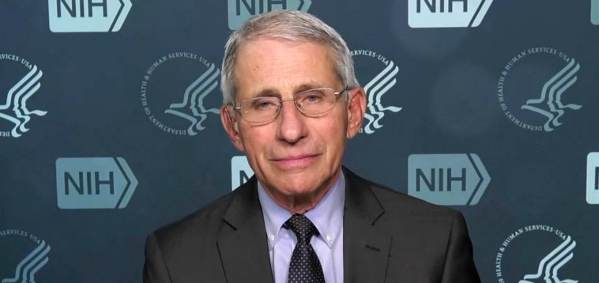
A federal database tracking research grants that included an award from Dr. Anthony Fauci’s agency to the Wuhan Institute of Virology can no longer be accessed.
The development reported by National Pulse comes amid controversy over the origin of the COVID-19 pandemic and the funding by Fauci’s National Institute of Allergy and Infectious Diseases of dangerous gain-of-function research at the Wuhan Institute of Virology.
The now-inaccesible National Institutes of Health database documented a nearly $3.7 million grant by NIAID for joint research by Peter Daszak’s EcoHealth Alliance and the Chinese government-run lab on “Understanding the Risk of Bat Coronavirus Emergence.”
Meanwhile, House Republicans are preparing to release a report on the origins of the pandemic finding that “the preponderance of evidence suggests SARS-CoV-2 was accidentally released from a Wuhan Institute of Virology laboratory,” Fox News reported. The report will come only weeks ahead of President Biden’s deadline for the intelligence community’s review into the pandemic’s origins.
Fauci has vehemently insisted in congressional testimony and elsewhere that the NIAID did not fund gain-of-function research at the Wuhan lab. In the controversial research, which had been suspended under the Obama administration, scientists increase the transmissibility and virulence of a virus that could “spill over” from animals to humans. The purpose of genetically engineering a lethal virus is to facilitate the preparation of vaccines and treatments ahead of a potential outbreak. But there is growing circumstantial evidence that President Trump and others who were dismissed as tinfoil-hat conspiracy theorists correctly assessed that the novel coronavirus came from the Wuhan lab and not from a nearby animal market.
An archived version of the dead NIH link shows the study fit the general description of gain-of-function research:
We will use S protein sequence data, infectious clone technology, in vitro and in vivo infection experiments and analysis of receptor binding to test the hypothesis that % divergence thresholds in S protein sequences predict spillover potential. We will combine these data with bat host distribution, viral diversity and phylogeny, human survey of risk behaviors and illness, and serology to identify SARSr-CoV spillover risk hotspots across southern China. Together these data and analyses will be critical for the future development of public health interventions and enhanced surveillance to prevent the re-emergence of SARS or the emergence of a novel SARSr-CoV.
Last month, Sen. Rand Paul, R-Ky., sent a criminal referral to the Department of Justice accusing Fauci of lying to Congress about his role in funding research at the Wuhan lab.
In a Senate hearing on July 20, Paul warned Fauci that “there will be responsibility for those who funded the lab, including yourself.”
“I totally resent the lie that you are now propagating, senator.” Fauci shot back.
See the Fox News interview:
BREAKING: Sen. Rand Paul: "I will be sending a letter to the Department of Justice asking for a criminal referral" into Dr. Fauci – https://t.co/p0bxXRPZaN pic.twitter.com/vWrwu8ET1E
— Breaking911 (@Breaking911) July 21, 2021
See the exchange Tuesday between Paul and Fauci:
Things just got tense between Senator @RandPaul and Dr. Fauci.
PAUL: "There will be responsibility for those who funded the lab, including yourself."
FAUCI: "I totally resent the lie that you are now propagating, Senator." pic.twitter.com/RZq3ESb9xM
— Townhall.com (@townhallcom) July 20, 2021
A day later, Sen. Ron Johnson, R-Wis., backed Paul’s referral in an interview with Fox Business’ Maria Bartiromo, contending Fauci is “culpable.”
“He’s lying and he needs to be held accountable,” he said.
See Sen. Johnson’s remarks:
In May, Paul said in an interview that while there’s no hard proof yet regarding the origin of the COVID-19 pandemic, it was becoming clearer that Fauci “could be culpable for the entire pandemic.”
In an interview with “Fox & Friends,” he pointed out that the sole U.S. representative of the World Health Organization team investigating the origin of the pandemic was Peter Daszak of EcoHealth Alliance, which received funds from NIAID for the bat coronavirus research at the Wuhan lab.
In May, Paul confronted Fauci with the lab-leak theory, asking him directly if the NIH funded gain-of-function research at the Wuhan lab. Fauci declared “the NIH and NIAID categorically has not funded gain-of-function research to be conducted in the Wuhan Institute.”
In May 2017, Americans scientists who had received grants from Fauci’s NIAID headlined a conference hosted by the Wuhan lab focusing on “gain of function research and gene editing,” the National Pulse reported.
Fauci is seen on video at a January 2018 NIAID Advisory Council meeting announcing the reinstatement of gain-of-function research and defending its use, the Gateway Pundit reported.
See the video:
In May, former New York Times science writer Nicholas Wade wrote a lengthy analysis of the origin of the pandemic in which he concluded that while hard proof is lacking — due largely to China blocking access — the available evidence overwhelmingly points to a leak from the Wuhan lab.
Via Wnd


